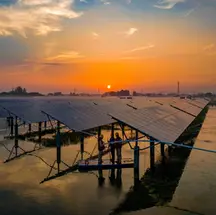


THE CLIMATE OVERSHOOT COMMISSION
How should the world reduce
the risk of temperature overshoot?
1.15°C
The average global temperature in 2022
98%
at least one of the next five years, and the five-year period as a whole, will be the warmest on record
IPCC
Says that climate-related risks for natural and human systems are higher for global warming of 1.5 °C than at present, but lower than at 2 °C
Credit: WMO 2023 Report
The Report
Reducing the Risks of Climate Change
-
The risk of climate overshoot – that is, of exceeding the Paris Agreement goal of limiting average global warming to 1.5°C – is high and rising, and with it the risk of worsening impacts on human health, food security, water availability, social stability, and ecosystems.
-
People worldwide would welcome a safer, cleaner, more equitable world. All countries could, and should, act now to help bring about such a world.
-
The CARE agenda offers an integrated set of recommendations for achieving this by
-
Cutting emissions of greenhouse gasses
-
Adapting to the unavoidable impacts of climate change
-
Removing carbon from the atmosphere
-
Exploring solar radiation modification
-




Key Report Details
Recommendations by the Commission - The CARE Agenda
Details:
-
Cut Emissions - Accelerate emissions reductions and consolidate decarbonization.
-
Adapt - Expand adaptation and fully mainstream into development.
-
Remove - Develop and deploy higher-quality carbon dioxide removal to help achieve net-zero emissions targets and beyond.
-
Explore - Adopt a moratorium on large-scale solar radiation modification and expand research and governance dialogue.

Approaches to Reducing Risks from Climate Overshoot
These approaches should be researched and evaluated so that well-informed decisions can be made. Governance is crucial, and should be effective, just, and equitable. But current arrangements are inadequate.

Boosting greenhouse gas emissions reductions

Greatly expanded and accelerated adaptation measures to reduce climate vulnerability


Removing excess carbon dioxide from the atmosphere
Possibly cooling the planet by reflecting incoming sunlight.

Scaling up climate finance especially for developing countries
The Concept of Climate Overshoot
The 1.5°C goal is not just a number. The international community set this limit to signal the point beyond which it considers the risks of climate change to be unacceptable. The Climate Overshoot Commission understands “climate overshoot” to mean crossing this threshold.
CO2 emissions to date

Credit: Climate Overshoot Commission
pg.23 Booklet 2

Emissions continue to rise, however, and the remaining carbon budget for limiting warming to 1.5°C is shrinking, despite more than 30 years of effort and progress in some areas, and despite the manifest benefits of decarbonization. The Commission recognizes that the risk of climate overshoot is significant and imminent and requires us all to act now.
Credit: Climate Overshoot Commission
pg.24 Booklet 2
OUR MISSION
-
The purpose of the Commission is to consider the potential benefits, opportunities, and risks of a wide range of climate action approaches to minimize further increases in global temperatures and to reduce and manage the heightened risk of overshoot.
-
Its goal is to produce an integrated strategy for reducing the probability of breaching the Paris Agreement’s goals, and limiting and managing the risks brought about by an overshoot should it take place.
Commissioners include former heads of government, national ministers, directors of inter- governmental organizations, environmental group leaders, and academic experts.


2015
In Paris, the governments of the world agreed to limit global warming to well below 2°C and to pursue efforts to limit it to 1.5°C:
2022
IPCC concludes that it is alnost inevitable that we will temporarily exceed this 1.5°C:
2023
The Global Commission on Governing Risks From Climate Overshoot release their groundbreaking report in September 2023
The Commission
.jpg)
Who We Are
The Climate Overshoot Commission is holding the necessary conversations about whether and how these additional approaches could reduce the risks of a warming climate, and will recommend an integrated governance strategy.
The Commission is the first high-level group to address all these options in a holistic, integrated manner, free from conventional political constraints. Members include former heads of government, national ministers, directors of intergovernmental organizations, leaders of environmental groups, and academic experts.





















